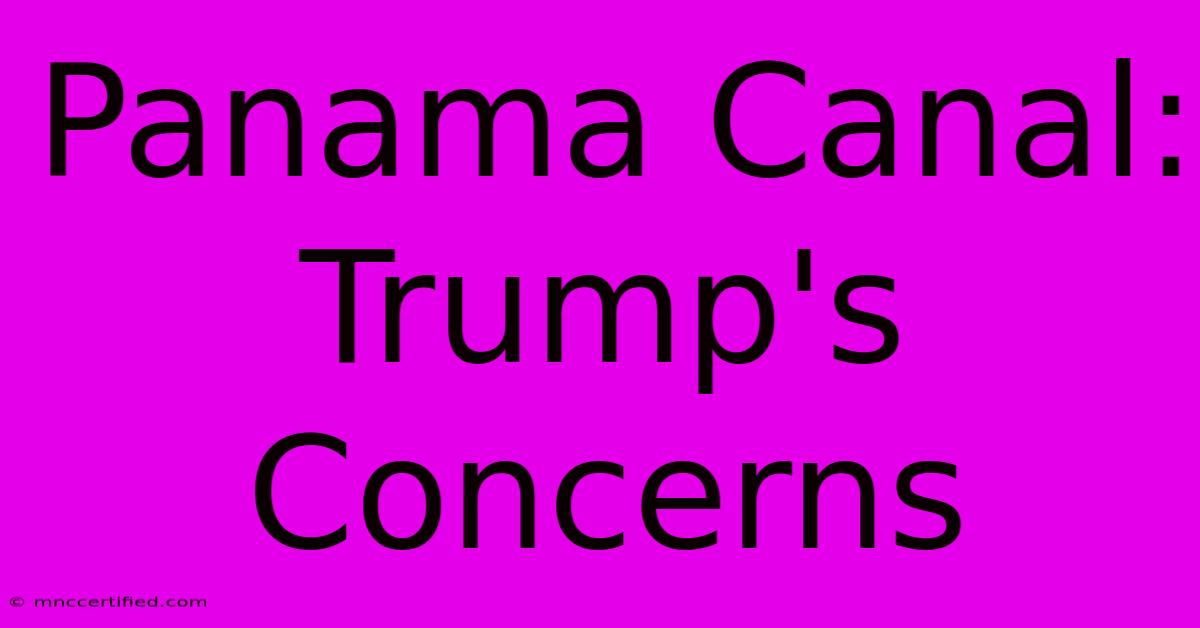Panama Canal: Trump's Concerns

Table of Contents
Panama Canal: Trump's Concerns and Their Lasting Impact
The Panama Canal, a marvel of engineering connecting the Atlantic and Pacific Oceans, has long been a point of strategic and economic interest for the United States. During Donald Trump's presidency, his administration expressed several concerns regarding the canal, raising questions about its management, security, and the potential influence of China. Understanding these concerns and their lasting impact is crucial to comprehending the complex geopolitical landscape surrounding this vital waterway.
Trump's Key Concerns Regarding the Panama Canal
Trump's administration voiced several key concerns regarding the Panama Canal, primarily centered around:
1. China's Growing Influence:
A major source of anxiety was the perceived increasing influence of China in the region. This stemmed from China's growing economic ties with Panama, including significant investment in infrastructure projects. The Trump administration feared that this economic leverage could translate into political influence, potentially compromising the canal's security and the US's strategic interests. The administration worried about the potential for China to gain access to sensitive information or even exert control over the canal's operations.
2. Canal Security and Infrastructure:
The administration also raised concerns about the overall security of the canal. This encompassed both physical security, including the risk of terrorism or sabotage, and the security of information related to the canal's operations. Maintaining the structural integrity and operational efficiency of the canal was also deemed critical. Any disruption to the canal's function could have significant global economic repercussions.
3. Fair Competition and Trade Practices:
Concerns were also raised about fair competition and trade practices within the context of the canal's operations. The administration emphasized the importance of a level playing field for US businesses and ensuring that the canal's operations remain transparent and unbiased. Concerns centered around the potential for unfair advantages being granted to certain countries, potentially at the expense of US interests.
The Impact of Trump's Concerns: Long-Term Implications
While Trump's presidency ended, the concerns he raised regarding the Panama Canal continue to resonate. These concerns have led to:
1. Increased Scrutiny of Chinese Investment:
The Trump administration's emphasis on China's growing influence has resulted in increased scrutiny of Chinese investment in Latin America and the Panama Canal region. This scrutiny extends beyond the US, with other nations also examining the implications of China's economic expansion in strategically sensitive areas.
2. Strengthened US-Panama Relations (with nuances):
While concerns were raised, the US has maintained a strong diplomatic relationship with Panama. However, this relationship is now characterized by a heightened awareness of strategic competition and the need for continuous engagement to safeguard US interests.
3. Focus on Canal Security and Infrastructure Upgrades:
The concerns regarding canal security have prompted renewed focus on both physical and cyber security measures. Investments in upgrading the canal's infrastructure and enhancing security protocols are ongoing, reflecting the ongoing importance of this vital waterway.
4. Ongoing Debate on Trade and Economic Policies:
The issues raised concerning fair trade and economic practices remain a topic of ongoing debate and diplomatic engagement. The Panama Canal's role in global trade necessitates a balanced approach that accommodates diverse economic interests while maintaining stability and security.
Conclusion: Navigating the Geopolitical Waters
The Panama Canal remains a critical component of the global economy and a key strategic asset. Donald Trump's concerns, while expressed during his presidency, highlight the enduring challenges associated with managing this vital waterway in an increasingly complex geopolitical environment. Addressing concerns about China's influence, ensuring canal security, and promoting fair trade practices will require continuous diplomatic engagement and proactive strategies from the US and other global stakeholders. The legacy of these concerns will continue to shape the future of the Panama Canal and the region for years to come.

Thank you for visiting our website wich cover about Panama Canal: Trump's Concerns. We hope the information provided has been useful to you. Feel free to contact us if you have any questions or need further assistance. See you next time and dont miss to bookmark.
Featured Posts
-
Toys For Tots Tpas Top Donation Drive
Dec 24, 2024
-
Nolan To Adapt Homers The Odyssey
Dec 24, 2024
-
Two Seismic Shifts Hit Honda Nissan
Dec 24, 2024
-
Gaetz Ethics Probe Report Details
Dec 24, 2024
-
Madrid Thrashes Sevilla Navas Last Game
Dec 24, 2024